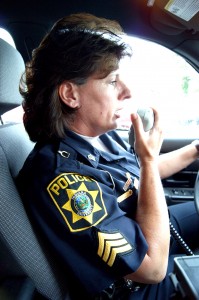
The IUS Police Department released the 2010 Annual Security and Fire Safety Report on Sept. 30.
Charles Edelen, IUS Police chief, said they compiled the report in compliant with the UCTR Part 1 crimes, which is mandated by the Clery Act and the U.S. Department of Education.
“It’s published once a year by a deadline of Oct. 1,” Edelen said. “So, every university does one. It’s called the Clery Act, and it’s a federal law.”
The report includes specific criminal activities obtained by the IUS Police Department and other local agencies. It also includes on-campus and off-campus statistics, as well as residential facilities and public property.
The overall number of crime and referrals in 2010 decreased from 106 in 2009 to 47 in 2010.
“It was really well,” Edelen said. “We went up a bit in burglaries, but, overall, I think we’re a very safe campus.”
The number of reported burglaries increased from two in 2009 to eight in 2010. All violations occurred on campus, including four in the residential facilities.
However, Edelen said no direct changes in police operations have resulted to combat this increase.
“There is nothing specifically we’ve done, because none of the burglaries are related to each other, so there really is no way to direct specific responses,” Edelen said. “If there was a pattern or reason to suspect or link, we would focus in on that.”
According to the report, drug crimes increased to 11 in 2010 from four in 2009. Seven occurred on campus and four on public property.
Edelen said no action was planned that resulted in the increase of reported drug crimes. Drug referrals, however, decreased to six in 2010 from 20 in 2009.
“Under advice of the county prosecutor, any drug cases we find are handled criminally,” Edelen said. “So, he has requested that any drug violations found be cited, at least, if not arrested.”
Both crime and referral liquor laws decreased in 2011. There were zero liquor crimes reported in 2010 — a decrease from 21 in 2009.
Last year, there were 21 disciplinary referrals reported — a decrease from 53 in 2009 — and all in the residential facilities.
He said they didn’t make any arrests or citations in 2010.
“Student behavior is better, we didn’t do anything different to cause that,” Edelen said, “and the drugs went up, of course.”
Edelen said a student who commits a crime on campus may face other repercussions besides legal consequences, including possible academic probation.
Other reported crimes included one incident of on-campus forcible fondling in 2010 from zero in 2009.
Edelen said he attributes the low crime rate to the isolated location of IU Southeast in comparison to other campuses in urban settings.
“I would say, overall, we are very lucky, and part of it is because we’re semi-isolated,” Edelen said. “We’re not right in the middle of an urban environment where people are walking through [and] where opportunities would arise for something to turn up missing.”
He also said he credits the students’ behavior to the relatively minimal crime rate.
“I think everybody here seems to listen, and they’re here to get their education, and that’s what they’re focused on,” Edelen said.
By STEPHEN ALLEN
Staff
allen68@imail.iu.edu


